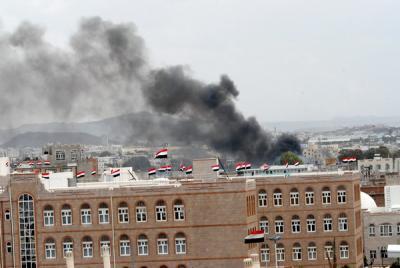Yemen forces kill 31 as anti-regime protests rage
Hammoud Mounassar
SANAA, Hammoud Mounassar- Security forces shot dead at least 31 people in Yemen on Monday, among them two children killed by snipers, protest organisers and medics said, as the United States called for restraint.
Organisers of anti-regime demonstrations in Sanaa said in a statement that 27 people were killed on Monday and that 942 people were wounded by gunfire over the past 48 hours, and that 47 are in critical condition.
There was also bloodshed in the flashpoint city of Taez south of Sanaa with four protesters shot dead, a medical source said.

Security forces and regime supporters attacked protesters with heavy weapons, anti-aircraft guns and mortars, the statement said, adding that hospitals faced huge shortages of medicine and equipment.
"We will not accept anything less than the immediate departure of (President) Ali Abdullah Saleh and his men," the organisers said, appealing to the international community to face up to its "moral responsibility."
"Saleh's family have become a danger for the region," they added.
Twenty-six people were killed in Sanaa on Sunday, medics said.
The US embassy said Washington hoped for a peaceful transition of power and hoped a Gulf Cooperation Council (GCC) initiative would be signed within a week to transfer power from Saleh to his deputy.
"The United States regrets the deaths and injuries of many people during protest marches in Sanaa yesterday (Sunday). In this tense situation, we call upon all parties to exercise restraint," a statement said.
"The United States continues to support a peaceful and orderly transition in Yemen, one which addresses the Yemeni people's aspirations for peace and security.
"We remain hopeful that an agreement will be reached that leads to the signing of the GCC initiative within one week."
Monday's bloodletting coincided with the arrival in Sanaa of UN envoy to Yemen Jamal Benomar and Gulf Cooperation Council chief Abdulatif al-Zayani for what a diplomat said was the signing of a UN roadmap for the transfer of power.
A medic in Sanaa said that among Monday's dead were "two children and three soldiers from the First Armoured Brigade" headed by dissident General Ali Mohsen al-Ahmar.
Rights watchdog Amnesty International called on Sanaa to halt the violence or risk civil war.
Witnesses said security forces fired on protesters camping out at Al-Zubair Road near Sanaa's Change Square, the epicentre of anti-regime protests.
Snipers shot dead the children, identified as Anas and Louay al-Suaidi, when they were in their parents' car on a road west of Change Square, their mother said.
"The Yemeni authorities must immediately stop the killing of peaceful protesters by security forces," the London-based Amnesty said in a statement.
"Eruptions of violence point to a growing risk of civil war," said Phillip Luther, Amnesty's deputy director for the Middle East and North Africa.
On Sunday, a march by tens of thousands of protesters from Change Square to the city centre came under heavy fire from security forces at Al-Zubair Road, near the office of Saleh's son Ahmed, head of the elite Republican Guard.
Medics reported 26 killed and 500 wounded.
Early on Monday, thousands of protesters staged another march from Change Square to join the tens of thousands who had camped out at Al-Zubair Road.
A high-level Saudi official said on Saturday that Vice President Abdrabuh Mansur Hadi would sign a Gulf-brokered initiative "within a week."
Saleh, who has ruled Yemen since 1978, has been recovering in Saudi Arabia after a June 3 explosion at his presidential compound, but has so far refused to transfer power to his deputy or to sign the so-called Gulf Initiative.
Saudi King Abdullah met Saleh on Monday to discuss the violence, the official Saudi SPA news agency said, in their first meeting since Saleh arrived in Riyadh for medical treatment.
Saudi Arabia is one of the authors of the GCC initiative, and Saleh's refusal to sign it has angered its sponsors who, along with many in the international community, fear a total meltdown of the political order in Yemen.
Such a development could pave the way for Al-Qaeda-linked militants to overrun the country.
The GCC plan, proposed last spring, calls on Saleh to step down as president and hand over all constitutional authorities to Hadi. In return, Saleh and his family would become immune from prosecution.
Yemen's foreign minister on Monday expressed "sorrow and condemnation" over Sunday's violence.
"The government of Yemen expresses its sorrow and condemnation for all acts of violence and bloodshed as those happened yesterday in Sanaa," Abu Bakr al-Kurbi told the UN Human Rights Council in Geneva.
"The government will investigate and hold accountable all those who were in charge of these acts."
--------------------------------------------------------------------------------